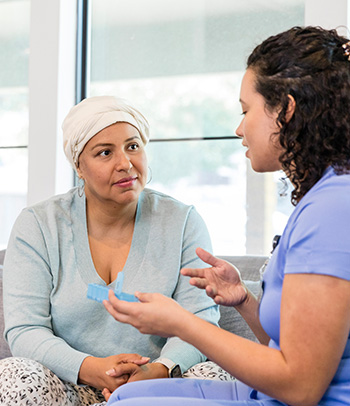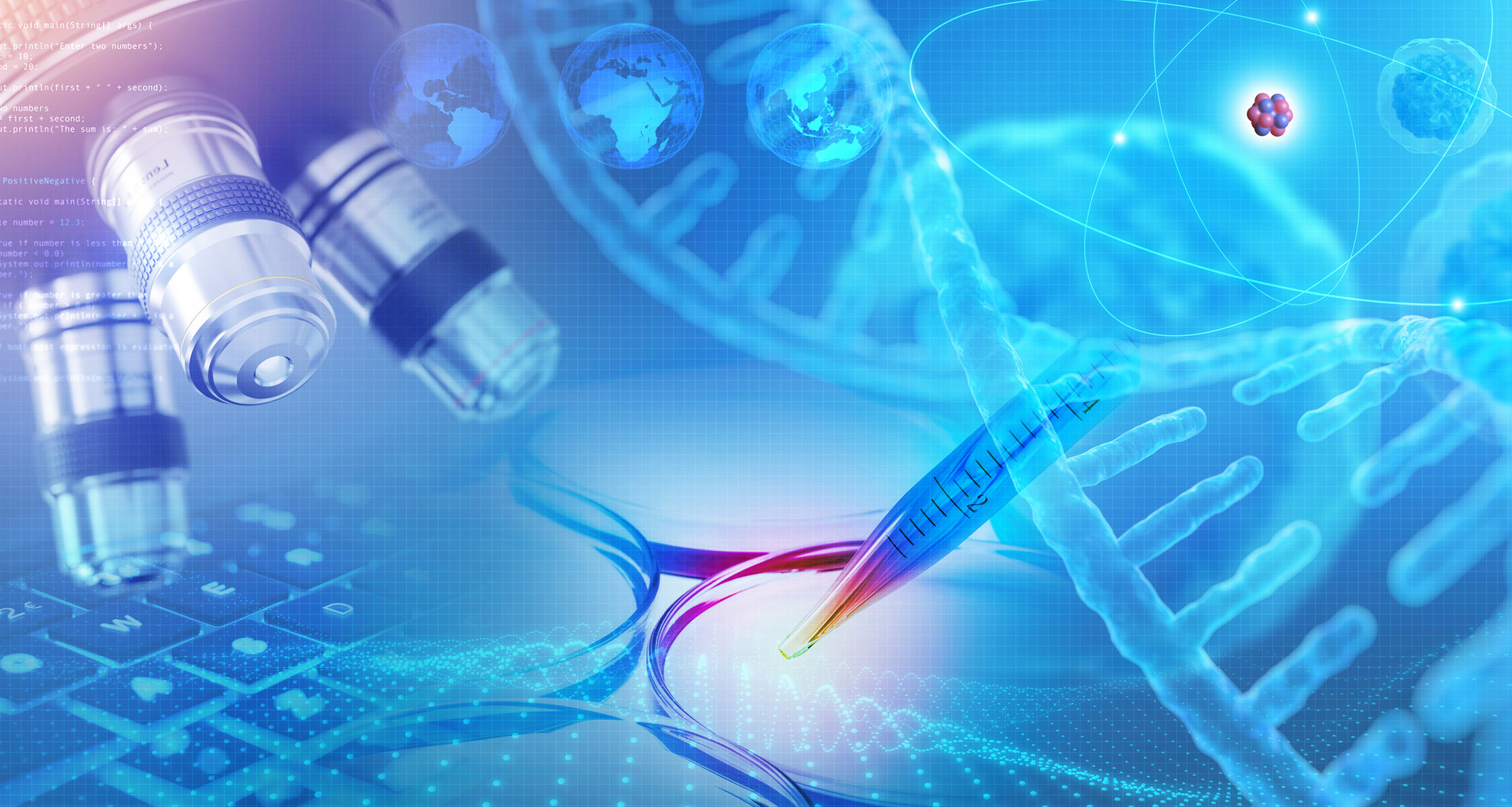Genetic testing looks for specific mutations in your genes that may increase your risk of certain health conditions or diseases such as cancer.
In 2024, more than two million new cases of cancer will be diagnosed in the United States, according to the National Cancer Institute. It’s a disease that impacts people from all walks of life, including approximately 56,000 Veterans within the Department of Veterans Affairs (VA) health care system each year. While these numbers seem high, thanks to advances in our understanding of cancer, early detection measures and improved treatments, survival rates are climbing, and cancer patients are able to live longer and fuller lives.
Some of the most common types of cancer, such as breast, prostate and colorectal cancers, are sometimes associated with a genetic component. Because of this, some cancer patients may benefit from genetic testing and counseling.
Learn more about genetic testing and counseling, its role in cancer diagnosis and care, and how VA is using the technology to fight and treat cancer in Veterans.
What Is Genetic Testing and How Does It Work?
According to information shared by the National Library of Medicine, you have between 20,000 to 25,000 genes found inside the cells of your body. These genes are made up of DNA that controls how your body grows, develops and maintains itself. DNA changes that are harmful to your health are called mutations.
Gene mutations happen for many reasons. Some happen because of exposure to certain chemicals, radiation or smoking for example. Some mutations occur by chance, and other mutations are inherited from our parents.
Genetic testing, according to the National Cancer Institute, looks for specific mutations in your genes that may increase your risk of certain health conditions or diseases such as cancer. Genetic testing is usually requested by a genetic counselor or a health care provider who has reviewed your personal and family medical history and identified a potential inherited cancer pattern. The counselor or health care provider will go over your personal and family medical history and discuss your cancer risks, whether genetic testing might be helpful, and what specific gene changes should be tested for.
If you go ahead with the genetic testing, testing is done on a small sample of bodily fluid or tissue, such as blood, saliva or skin cells. The sample is sent to a genetic testing laboratory and results are usually returned within a few weeks.
What Are Some of The Potential Benefits of Genetic Testing?
Genetic testing offers a range of potential benefits for patients to consider, including:
- An opportunity to understand and potentially manage your cancer risk
- Suggestions for the most appropriate treatments, including lifestyle changes, early detection options, medicine to reduce risk or even preventative surgeries
- An opportunity for family members to learn about their own cancer risk
What Are the Potential Downsides of Genetic Testing?
While many patients and families can benefit from knowing the results of their genetic testing as it relates to cancer, there are potential downsides to consider too, including:
- Mental stress from learning about a genetic change that increases your risk for cancer, as well as for your relatives (a patient’s children for example)
- Feelings of guilt upon learning one doesn’t have a harmful change that is present in other family members
- Uncertainty and stress from receiving an uninformative test result
- The possibility of a rare false-positive result or false-negative result
- Family conflict or “blame” when one learns about an inherited gene mutation
A genetic counselor is helpful in navigating all of these potential benefits and downsides, as well as any questions you may have before you consent to genetic testing. Be sure to discuss genetic testing with your primary care physician first, talk to a counselor before doing genetic testing, and go over important issues such as:
- The purpose of the test
- The reasons for getting the test
- The test’s accuracy
- The benefits and limitations of the test
- Screening and treatment options that might be available based on the results
- Availability of counseling and support services after testing occurs
- The cost or insurance implications related to genetic testing
- The impact on family members once results are received
Who Should Consider Genetic Testing?
According to the American Cancer Society, genetic testing may be recommended for:
- A person with a strong family history of certain types of cancer
- A person already diagnosed with cancer (especially if the cancer was diagnosed at a young age or if the cancer is uncommon)
- A person with a family member who is known to have an inherited gene mutation that increases their risk of cancer
To learn more, check out the American Cancer Society’s detailed list of people who may benefit from genetic testing.
If you are concerned about your risk factors for cancer, a pattern of cancer in your family or a cancer you’ve been diagnosed with, talk to your health care provider about whether genetic testing and counseling might be right for you.
How Is VA Using Genetic Testing for Cancer Patients?
VA is dedicated to providing exceptional health care to eligible Veterans, including those who may be predisposed to cancer. Within its National Oncology Program, VA offers Clinical Cancer Genetics Service, a program that provides genetic testing and counseling to Veterans. The program’s highlights include:
- A personalized cancer risk assessment, identifying potential inherited cancer risks
- Informed discussion about cancer treatment options
- Assistance in navigating your genetic information and its implications, including additional testing for close relatives
- Preventive steps and surveillance options tailored to you
- Counseling to assist you in navigating the emotional and logistical implications of your genetic information
What Does This Mean for VA’s Cancer Patients?
As you learn more about this program, it may be helpful to see how it works for actual patients. VA News shares the story of Veteran Patti Duhon who was diagnosed with breast cancer in 2016. Through genetic testing, she found out she carried a gene mutation that not only increased her risk for developing breast and ovarian cancers but also raised her risk for the reoccurrence of cancer. Patti has two children who both have a 50% chance of carrying the same gene.
Once the gene was detected, she was able to receive personalized cancer care, including:
- Cascade testing for family members – Her children were counseled about their risk and given screening recommendations and options for proactive risk management.
- Informed treatment and surveillance – Because of the gene mutation she has, Patti now receives annual mammograms and MRIs twice a year.
VA also shared a video of Patti explaining her diagnosis and the care she received using VA’s Clinical Cancer Genetics Service.
How Can I Learn More?
- To learn more about how VA is using genetic testing for cancer patients and whether it’s something you should explore, have a conversation with your health care providers. Ask about the purpose of genetic testing and the possible benefits, as well as any potential harm or limitations.
- Check out VA’s National Oncology Program Guide to learn more about the services, initiatives and tools VA is using to diagnose and treat cancer in Veterans. Explore additional information about VA’s oncology services, read Veteran testimonials and access helpful videos and flyers.
- Read about VA’s partnership with the Prostate Cancer Foundation to use genetic testing and precision oncology to treat Veterans with metastatic prostate cancer. If an acquired or inherited gene mutation is found, patients can learn about other cancer risks, begin screening for early detection, try new drugs and share what they learn with other family members who may have the same gene mutation.
- Stay up to date on expanded screenings, cancer risk assessments and benefits offered through VA.
- Healthy Homefront has several informative articles related to different cancers, including breast, prostate, cervical, colorectal, lung and ovarian cancers.
- The National Cancer Institute and the American Cancer Society both have a wealth of information related to genetic testing, its benefits and limitations.
VA is committed to providing high-quality and innovative care to Veterans, including the 56,000 Veterans diagnosed and treated for cancer each year. Find out if genetic testing is right for you and access the care you deserve.







